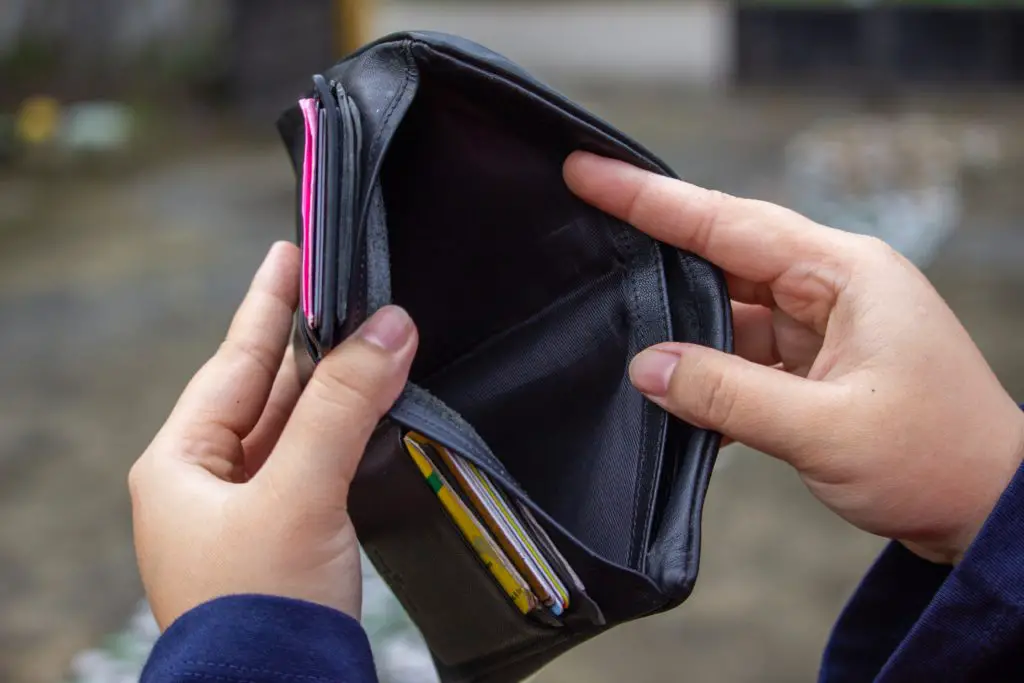Financial abuse, a less-known but equally destructive form of manipulation, often lurks in the shadows of narcissistic relationships. In this insightful blog post, we’re taking a closer look at this covert form of abuse and how it intertwines with narcissistic behavior.

Table of Contents
Narcissistic Personality Disorder: Unraveling the Intricacies
Narcissistic Personality Disorder, commonly referred to as NPD, is a tricky psychological condition that’s often shrouded in misconceptions. Unraveling its complexities, it becomes clear why it’s so vital in the context of financial manipulation in close relationships.
People with this disorder display a heightened sense of self-importance, an insatiable need for attention and admiration, and a lack of empathy. They often manipulate others to maintain their perceived superiority and control.
Financial abuse in relationships, where one person controls the other’s access to economic resources, becomes a powerful tool for narcissists. It serves their need for power and dominance, all under the guise of love and protection. This manipulation is not always blatant, making it harder to identify and resist. For example, a narcissist may insist on controlling all financial decisions ‘for the good of the relationship’ or even use guilt and shame to coerce their partner into financial dependency.
The Deceptive Tactics: Manifestations of Financial Abuse
Narcissists can be quite adept at using a smorgasbord of methods to exert financial control.
One classic strategy narcissists employ is total control over assets. They might insist on having every bank account under their name or demand complete oversight of all financial decisions, all while portraying this as ‘caring for the family’s financial security.’ Such scenarios can create a dependency, leaving the other party without access to funds.
On the other hand, they may resort to restricting their partner’s financial resources. For instance, they might discourage or outright forbid their partner from working, isolating them financially. The underlying message here: ‘You need me for survival.’
Another strategy can be exploiting their partner’s resources. Narcissists might rack up large debts in their partner’s name, burdening them with financial responsibility, while they escape scot-free.
A real-life example is Jane (name changed), who found herself financially trapped with her narcissistic partner, who took control of her savings and incurred large debts in her name. She was left penniless, grappling with debt, and a severely damaged credit score.
These examples highlight the intricate web of financial abuse spun by narcissists
Implications of Financial Abuse: Emotional and Monetary Costs
Financial abuse is a double-edged sword that goes beyond mere monetary control, cutting deep into both the emotional and financial lives of victims. When a narcissist manipulates the financial dynamics in a relationship, they’re not only tightening the purse strings but also inflicting emotional damage. Victims often experience a loss of self-esteem, as their independence and confidence erode under this controlling behavior. Feelings of fear, anxiety, and helplessness become their constant companions, drastically impacting their mental health.
On the financial front, the damage can be crippling. Victims may find themselves in a dire situation where they’re deprived of financial resources or buried under a mountain of debt. This scenario makes escaping the abusive relationship an even more daunting task.
Take the story of Mark (name changed), who endured financial abuse at the hands of his narcissistic partner. After years of having his income controlled and being coerced into making poor financial decisions, he found himself drowning in debt, with no savings, and a credit score in ruins. Furthermore, the emotional toll was severe, leaving Mark grappling with anxiety and a lack of self-confidence.
Such stories underline the devastating aftermath of financial abuse. It’s a stark reminder of why shining a spotlight on this covert form of abuse is necessary to help victims break free and reclaim their financial autonomy.
What does a narcissist do when faced with financial ruin?
A narcissist might react differently than one might expect. This isn’t your everyday scenario, but a situation that directly challenges the grandiose self-image that a narcissist carefully constructs and fiercely defends. Here’s a look at what could happen.
Typically, a narcissist craves control, especially financial, to maintain their inflated self-perception and dominance. When financial ruin threatens this carefully curated façade, their reactions can vary, but a few common themes often emerge.
One potential reaction is denial. A narcissist might refuse to acknowledge the dire financial situation, clinging to the illusion of control and superiority. They may continue to overspend and live beyond their means, perpetuating the problem instead of addressing it.
Alternatively, a narcissist may shift blame onto others, refusing to accept responsibility for the crisis. They might pinpoint a partner, a family member, or even market conditions as the scapegoat for their financial downfall, shielding their ego from the harsh truth.
In some cases, a narcissist might even resort to further manipulative tactics. These could include financial abuse towards their partner, such as forcing them to take on debt or pressuring them into bailing the narcissist out of their financial predicament.

Warning Bells: Identifying Financial Abuse Signs
When tangled up in the web of narcissistic manipulation, identifying financial abuse can be a complex task. However, shining a spotlight on the clear indicators of financial exploitation could be your first step towards reclaiming control.
A crucial red flag is the persistent control over financial resources. This might involve the narcissist managing all the income, savings, and expenditures, leaving you with little to no knowledge or say in these matters. They might also limit your access to shared bank accounts or refuse to involve you in financial decisions.
Another sign is if you find yourself constantly held accountable for every penny spent. Narcissists often employ tactics like budget constraints, excessive scrutiny of expenses, or unjustified blame for financial instability. In extreme scenarios, they might even monitor your spending, making financial independence a challenging feat.
Surprisingly, financial abuse isn’t always about withholding money. Narcissists might force you into taking on debts or loans against your will, trapping you in a cycle of financial obligations. You might also be coerced into signing financial documents without fully understanding the implications.
Lastly, if you’ve been asked to give up your job or if your attempts to work are continuously sabotaged, this could be a potent sign of financial abuse. Remember, an essential aspect of this abuse is control, and dictating employment status is a classic tool for maintaining that dominance.
Will a narcissist drain you financially?
A narcissist’s behavior, especially in intimate relationships, can indeed lead to serious financial depletion. Narcissists typically use money as a tool of control and power, which can ultimately drain you financially.
Often, a narcissist sees nothing wrong in exploiting their partner’s resources for personal gain. They may deplete shared savings for their individual desires or manipulate you into taking on debts to fund their lavish lifestyle. Moreover, narcissists often exhibit a sense of entitlement and disregard for their partner’s financial needs or goals.
Even more worryingly, financial exploitation by a narcissist can also extend to employment. A narcissist might discourage you from working or even sabotage your job efforts to keep you financially dependent on them. This type of control not only impacts your present financial stability but can also have lasting effects on your career progression and future financial security.
So yes, a narcissist can, and often will, drain you financially if given the opportunity. It is important to stay vigilant and take action if you notice signs of financial exploitation in your relationship.

Escaping the Vicious Cycle: Handling Financial Abuse
Reclaiming financial independence in the wake of narcissistic abuse may appear daunting but is entirely attainable with a strategic plan and the right support. The journey begins with arming yourself with knowledge about your financial situation. Understand your assets, liabilities, income, and expenses. This financial transparency is your first line of defense against abuse.
Concurrently, it’s essential to foster your emotional well-being. Emotional recovery might involve dealing with feelings ranging from relief to guilt, grief, or anger. A mental health professional can provide essential support, offering coping strategies and helping rebuild your self-esteem.
The path to financial freedom includes practical steps like opening a new bank account, setting a personal budget, and rebuilding your credit score. Consult a financial advisor to develop a comprehensive plan, including debt repayment strategies and future budgeting. In addition, legal advice could be indispensable, especially when addressing shared assets or debts.
Don’t shy away from leaning on your support system. Discussing your experience with trusted friends, family, or support groups can provide encouragement, practical advice, and a sense of shared experience. These resources provide a safe space to learn from others who’ve faced similar circumstances.
Throughout this journey, prioritize both your financial independence and emotional health. This might mean returning to the workforce, learning new skills, and partaking in self-care activities.
Final Thoughts: From Recognition to Recovery
In conclusion, financial abuse, intertwined with narcissistic behavior, is a significant concern that often goes unnoticed. It can leave victims financially crippled and emotionally scarred, but with knowledge, planning, and support, one can break free from this form of abuse. Understanding the complexities of Narcissistic Personality Disorder can shed light on how financial manipulation operates in relationships. Narcissists often employ various deceptive tactics to exert control, creating a cycle of dependency.
However, recognizing the warning signs is the first step towards freedom. From persistent control over financial resources to coerced debts, these red flags can help victims identify the abuse. Yes, a narcissist can indeed drain you financially, but with a strategic plan and emotional support, regaining financial independence is achievable. This journey involves practical steps like understanding your finances, creating a budget, and rebuilding credit. Also, leaning on trusted individuals and professional advice can aid in navigating this challenging path. This exploration has emphasized the crucial need to raise awareness about this covert form of abuse, helping victims regain control and embark on a journey towards recovery.
